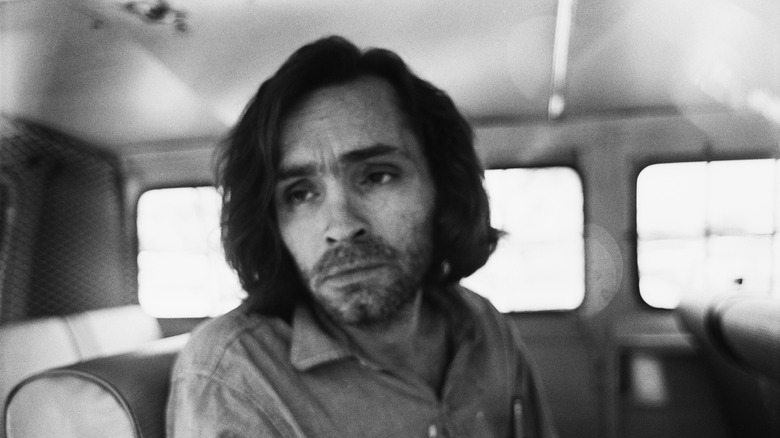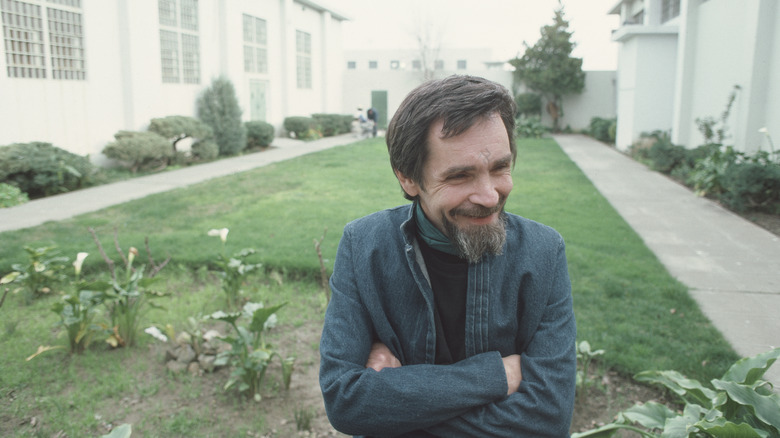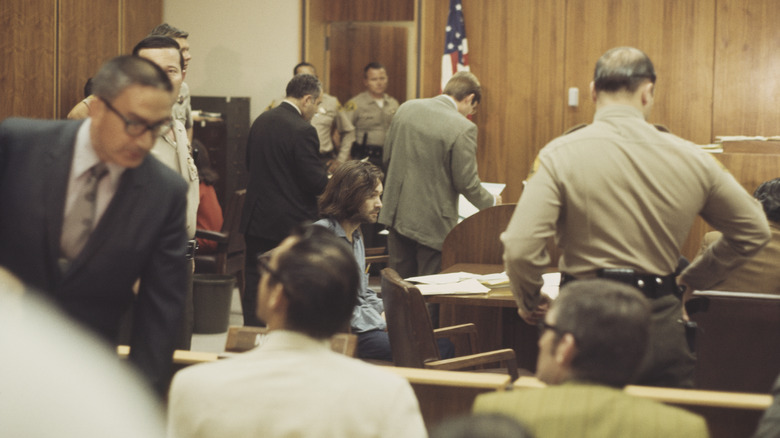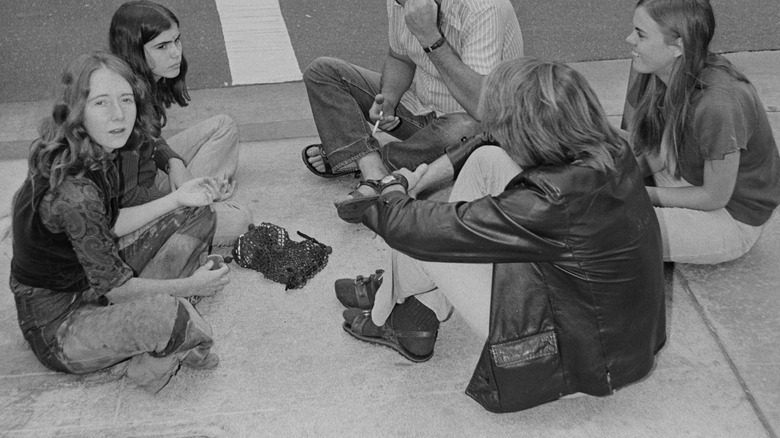The Disturbing Final Words Of Charles Manson
Throughout his nearly 50 years behind bars, Charles Manson never showed any remorse or even admitted any guilt for his infamous crimes. The summer 1969 murders of at least nine people — including the pregnant actor Sharon Tate — perpetrated by Manson's followers on his orders continue to haunt and fascinate the world. Manson's final words to a documentary producer, James Buddy Day, who interviewed him at length during the killer's last year alive, showed no contrition and were instead boastful.
"I'm the most famous human being not only that is alive, but the most famous human being that ever lived," Manson told the documentary producer (via YouTube). "And I'm not even dead yet. What do you think is going to happen when I die?" The killer's conversations with Day — which are included in the documentary "Charles Manson: The Final Words" and the book, "Hippie Cult Leader: The Last Words of Charles Manson" — were his last before he died in November 2017.
A series of phone calls
James Buddy Day was surprised to get a phone call from Charles Manson. He'd written to Manson asking him for an interview but had little faith that the killer would actually call him. Yet here was Manson on the other side of the line. "What do you say to the most infamous mass murderer of all time if given the chance?" Day wondered (via LA Weekly). "I knew what I wanted: To hear Manson's story in his own words and to get his permission to make a documentary based on that story."
Over several weeks, the two men kept up regular phone correspondence. During one conversation Manson, unprovoked, claimed he had been railroaded and was an innocent. He was held responsible for the infamous murders of Sharon Tate and four others at her home on August 8 and 9, 1969, and the killings of Leno and Rosemary La Bianca in the early hours of August 10 (a jury convicted him of two other murders as well). "I didn't have nothing to do with killing those people," he told Day. "They knew I didn't have anything to do with it. They didn't want to hear it. I didn't get a defense; I didn't get to put on a trial." It was during one of these interviews that Manson also made the boast concerning his fame.
Manson claimed innocence
To James Buddy Day, Charles Manson downplayed his role as the leader of the so-called Manson Family, a group of runaways and dropouts who lived communally at a disused movie set called the Spahn Ranch. Police and prosecutors believed Manson ordered the murders to instigate a race war. But in Manson's telling, it was the others at the ranch who acted on their own. "I never ordered nobody to do anything," Manson told Day during one of their conversations in "Charles Manson: The Final Words." As Day delved deeper into the story, he determined the commune wasn't as hierarchical and the story not as clear cut as had been previously presented. "There are so many people involved in the Manson story, not one of them can say what really happened," Day told Time magazine. "No one was making decisions for the whole group."
While Day believes Manson's version of events is likely closer to the truth than the police and prosecutor's interpretation, he admits Manson was still responsible for what happened. "I think there's no question Manson is culpable for those murders, if not all of them," Day said. "The murders would not have happened without him.” Manson's claim of innocence provides a jarring contrast to his bragging about fame, a statement that smacks of pride and may offer a truer glimpse into what made him tick.
Not the first time he boasted of his fame
Not long after Charles Manson's final phone call to James Buddy Day, the killer died at a Bakersfield, California hospital of natural causes at 8:13 p.m. on November 19, 2017. He had been in the hospital for four days. While Manson's interview with Day may have been his last, a decade earlier he had made a similar boast about his fame to another researcher.
"I am the most famous person who ever lived," Manson told professor and criminologist Jack Levin in 2007 during an interview for a book on mass murder. Levine agreed with him, to a point. "That's only a slight exaggeration," he told Northeastern Global News. "There are many great people who preceded Manson and were world-renowned but didn't have the benefit of the mass media like Manson did." Levin believes there will never be another Manson. "He fit into the anti-establishment environment that prevailed during the 60s and 70s, and those days are gone," he said. "We could get another killer that influences young people but it wouldn't look anything like Manson."



